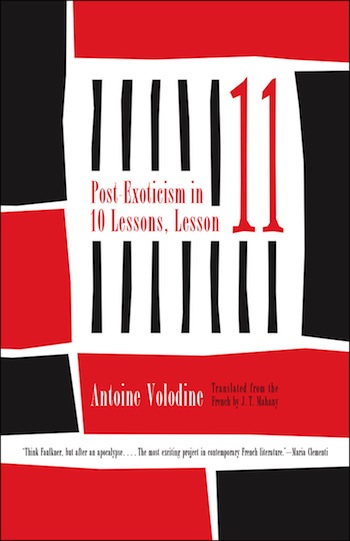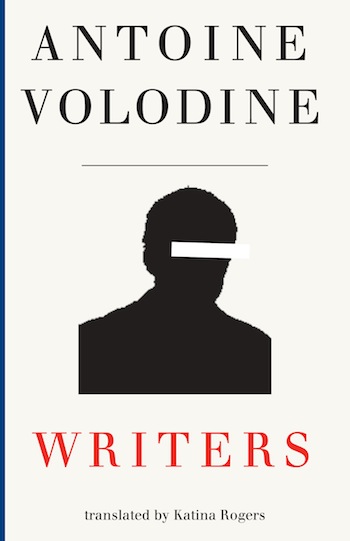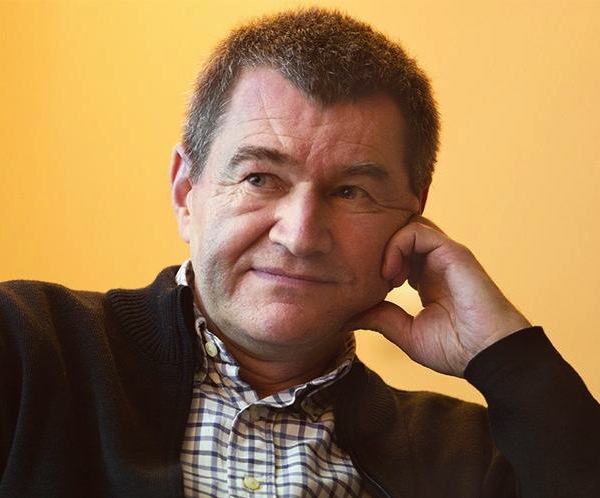Book Review: Dystopia as Our Future — Antoine Volodine’s “Post-Exotic” Oeuvre
Antoine Volodine is droll and makes the reader dizzy. He is a master of the prolonged, very prolonged, tongue-in-cheek spoof. But he is also dead serious.
Post-Exoticism in 10 Lessons, Lesson 11 by Antoine Volodine, translated by J.T. Mahany, Open Letter, 103 pp., $12.95.
Writers by Antoine Volodine, translated by Katina Rogers, Dalkey Archive, 108 pp., $14.95.
By John Taylor

These two books usher the reader into “post-exoticism,” a vast, baffling, haunting fictional world consisting, in French, of some 40-odd titles published by Antoine Volodine (b. 1950), whose name is actually a pseudonym, and by at least three other heteronyms, Manuela Draeger, Lutz Bassmann, and Elli Kronauer. About half of these books are written for young people, while some twenty others are, to use Volodine’s own post-exotic terms, “shaggås,” “romånces,” “novelles,” “interjoists,” “murmuracts,” and “narracts.” A rumor persists in France that this same writer, who has translated several Russian and Portuguese books, “invented” his translation of Maria Soudaiëva’s Slogans (2004) and that it, too, forms a part of his intricate fictional edifice. On the website of the Éditions de L’Olivier, the résumé of the life of Soudaiëva — who purportedly committed suicide in 2003 and whose family possesses her literary papers — certainly perks one’s bemused doubts.
Conceiving literature in this at once multifarious and coherent way certainly recalls the Portuguese poet Fernando Pessoa. Connoisseurs of French literature know about the equally extensive heteronymous oeuvre of Frédérick Tristan (b. 1931), who enlists characters from some of his novels to be narrators in others. Tristan has also published books under various pen names, most notoriously the poems of Danielle Sarréra. She likewise died young, left papers behind, and was a literary cult figure in France for many years until Tristan’s hoax was finally disclosed.
Of these two new fine translations (four others are available), Post-Exoticism in 10 Lessons, Lesson 11, is especially stupefying because of its strange scaffolding and heteronymous multiplicity. “Lesson 11” opens the book and, in a sense, subsumes the ten other lessons. Or does the title suggest that “Lesson 11” is a sort of post scriptum appended to a series of ten lessons? Yet “Lesson 11” envelops, as it were, the other lessons. Is the book thus a revised, “augmented” edition of a previous book consisting of only ten lessons? As always with Volodine, these and other formal questions generate both chuckles and knit brows.
Moreover, some of the independent “lessons,” inserted abruptly as framed texts amid the flow of the enveloping narrative (“Lesson 11”), are written by still other heteronymous authors: Ingrid Vogel, Iakoub Khadjbakiro, Ellen Dawkes, Erdogan Mayayo, and Yasar Tarchalski, not to mention Volodine’s longtime sidekicks Lutz Bassmann and Elli Kronauer. In one passage, the author (?) goes on to note that the “spokespeople” of the post-exotic literary movement include “Lutz Bassmann, Maria Schrag, Julio Sternhagen, Anita Negrini, Irina Kobayashi, Rita Hoo, Iakoub Khadjbakiro, Antoine Volodine, Lilith Schwak, Ingrid Vogel.”
In other words, Volodine’s voice is at once all the distinct voices and only one voice among them — a narrative configuration that suggests that his entire oeuvre is fashioned as a sort of Escher-like drawing. The book, which is also “about” Lutz Bassmann’s final days and the transmittal of certain post-exotic secrets, concludes with a mysterious unfinished sentence (“So I am the one who”) and a mock-bibliography (“By the Same Author, in the Same Collection”) of 343 titles penned by numerous other heteronymous authors. This bibliography is also designated as “Lesson 10.”

Needless to say, Volodine is droll and makes the reader dizzy. He is a master of the prolonged, very prolonged, tongue-in-cheek spoof. But in another respect, he is dead serious. While he gives a playful spin to well-established genres such as science fiction, literary criticism, and Soviet-era political dissident testimony, the author also formulates a disturbing critique of society. A vision of dystopia emerges from these books and it pertains to our present as well as, more generally, to the subversive role that writers can play in our society and, arguably, in any society.
Most of the post-exotic writers who pass like ghosts through these strange fictions are imprisoned in Gulag-like camps or prisons. Several have been tortured and are already dead. Volodine in fact provides a long alphabetical list of the “deceased dissidents” in Post-Exoticism in 10 Lessons, Lesson 11. He notes, among many other deceased figures, that Lutz Bassmann died in 1990, Ellie Kronauer in 1999, and Manuela Draeger in 2001. (Volodine is not listed. . .) The clandestine writings and whispered musings of all these dissidents pass from hand to hand, from ear to ear, from prison cell to prison cell, through the forty-odd books of this labyrinthine oeuvre. Volodine details how this is done in Writers and Post-Exoticism in 10 Lessons, Lesson 11, which is why these books open engaging passageways into his oeuvre.
For the reader encountering this unsettling work for the first time, Volodine at first seems to relate life in a Soviet work camp. And yet not too far into his narratives, which resemble novels, short stories, academic articles, or various hybrid forms, a hint or even a bald statement inevitably reveals that the dissident post-exotic writers have been incarcerated because of their anti-capitalist ideas and publications, as well as their occasional anarchistic or terrorist activities. Various texts and stories refer to “the triumph of the capitalist order and its wars.” But Volodine does not dwell on the anti-capitalist postures and pronouncements of his protagonist-heroes. His books are by no means political pamphlets. Allusions are suggestive, even troubling, but they remain vague. The details of the post-exotic writings and acts are not given. We learn that the present is not really our present — 1993, say, or 2004, or 2015 — but rather a narrative present that is usually located in the future. Which is not to say that we do not feel this future as our potential future, even our all-too-real present.
Sometimes this future is chronologically specified. In the faux-academic article, “The Strategy of Silence in the Work of Bogdan Tarassiev,” which is included in the heterogeneous collection Writers, Volodine records that Tarassiev “started his career as an author in 2017.” The narrator-critic evokes events from the years 2021, 2044, and 2048. He notes that Tarassiev built up his literary universe — in a book called Wolff — by deploying protagonists going by the names Woolf, Wolfo, Wulf, Walef, Woluf, Wollof, Wulw, Hollph, Hulluf, Wulluff, Wloffo, Wlaf, Walfo, Wolwö, Folf, Flöff, Wulwö, Wulwo, and Wolup. Tarassiev’s life later comes to a halt on September 14, 2053, with an act of political violence. At a cocktail party, he shoots the Minister of Industrial Development, two Secretaries of State, and two other people, before “turning the weapon on himself and blowing his brains out.” Volodine or, rather, the “author” of this article, adds: “That was fifty years ago.” Which brings us to the onset of the twenty-second century. Yet it seems credible that Tarassiev’s career as a mostly failed writer (despite the ephemeral success of Wolff), not to mention the world war of 2038, could easily have unfolded in our own day and age. Mixing up the post-exotic cards once again, Volodine’s story “Tomorrow Will Have Been a Lovely Sunday,” which is also contained in Writers, recounts the life of one Nikita Kouriline, a writer whose life begins on June 27, 1938, during the Stalinist era.

Antoine Volodine — he puts a playful spin on such well-established genres as science fiction, literary criticism, and Soviet-era political dissident testimony, but to formulate a disturbing critique of society.
So where do these post-exotic stories take place, and when? And what do they refer to? It is rarely clear, and this is their literary force. Andrei Tarkovsky’s film Stalker (1979), which is based on a nameless “zone” after some natural catastrophe or atomic war has taken place, comes to mind time and again, especially when Volodine describes a city, in “Lesson 11,” outside of Lutz Bassmann’s prison cell. Here “the sewers […] were fermenting, the docks in the harbor were emitting a rancid signal, the covered markets were stinking terribly. . . The mercury in the thermometers never fell below 34° or 35° Celsius, and it always rose back up from its nightly drop to give way to oppressive grayness. Puddles of mold spread across every wall…”
The short story “The Theory of the Image According to Maria Three-Thirteen,” which is included in Writers, lists films in which “several images […] make their deaf voice heard.” Not surprisingly, a visual from Stalker (and from two other films by Tarkovsky) is listed, along with images selected from Ingmar Bergman’s The Seventh Seal, David Lynch’s Eraserhead, Béla Tarr’s Damnation, and six other movies. One image, “the boat that moves away across an empty sea, overflowing with cadavers, at the end of Shame by Ingmar Bergmann,” typifies the death-haunted ambience of the prisons where the post-exotic writers are detained and martyrized. By the way, the imagery in Volodine’s narratives haunts and perturbs even more than his plots.
“We have always talked about something else, always,” writes Ellen Dawkes in the fifth lesson of Post-Exoticism in Ten Lessons, Lesson 11. Intentionally disorienting, Volodine’s oeuvre nonetheless points out time and again that this “something else” is essential, ominous, lies in wait for us, and is a struggle to define. Volodine implicitly suggests that literature, not everyday parlance or political discourse, is our most finely honed and reliable microscope and, especially, telescope.
John Taylor has recently published his translation of Lorenzo Calogero’s poetry, An Orchid Shining in the Hand: Selected Poems 1932-1960 (Chelsea Editions), for which he won the 2013 Raiziss-de Palchi Translation Fellowship from the Academy of American Poets. His recent translations also include Georges Perros’s Paper Collage (Seagull) and Philippe Jaccottet’s The Pilgrim’s Bowl (Seagull). He is the author of the three-volume Paths to Contemporary French Literature (Transaction Publishers).
Tagged: french fiction, Lesson 11, Post-Exoticism in 10 Lessons, translation
